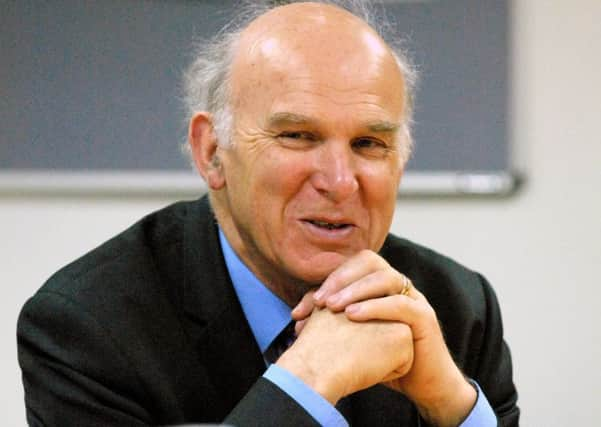Sir Vince Cable: Market forces mean Britain must remain in EU


There is a big cloud on the horizon: the dangerous void if the UK decides to exit the EU. Most of the companies I spoke to in Yorkshire recently agreed that leaving the EU would be a bad move.
Advertisement
Hide AdAdvertisement
Hide AdMy own view is informed by five years of Cabinet responsibility for business and trade.
The economic case is clear and settled: British business and British workers benefit, overall, from EU membership and stand to lose from leaving. That is the conclusion not just of the British Government’s economic studies but my academic colleagues at the LSE and international institutions, like the IMF, which have no national axe to grind.
The crux of the argument is the Single Market. It was negotiated in the 1980s by a British government led by Margaret Thatcher. The Single Market was not invented by Brussels bureaucrats, let alone Hitler or Napoleon.
Advertisement
Hide AdAdvertisement
Hide AdIt represented a British vision of an Open Europe: free trade in goods and services, free movement of capital, free movement of labour.
The juvenile caricatures flowing from the pens of Nigel Farage, Boris Johnson and others – the straight bananas, square strawberries and smaller condoms – aren’t just silly and fabricated; they miss the essential point that the Single Market reduces administrative barriers to trade.
I saw the process at work as Secretary of State. When I talked to Siemens about their new investment making turbines for offshore wind in Hull, they saw themselves as a European company operating within the Single Market.
When I went to Detroit to persuade the CEO of General Motors to invest in Ellesmere Port and Luton rather than Germany, a clinching argument was that they could continue to use the UK as a base for exporting to the rest of Europe.
Advertisement
Hide AdAdvertisement
Hide AdWhen I encouraged Nissan to make their latest model in Sunderland, a continued Single Market was key.
Our thriving aerospace industry relies heavily on European supply chains, and the Single Market. Airbus, a key part of the sector, has made it clear that they would see no future here if the UK left.
One of Britain’s real achievements has been to attract the world’s best companies on the back of access to the Single Market. The Brexiteers want to break that link: divorce. Divorce can work out but usually it is messy, nasty and costly.
Now you might say, those are the big guys. What about small business? But many small companies are in the supply chains of big companies. A lot are in Yorkshire making everything from components to specialist steels.
Advertisement
Hide AdAdvertisement
Hide Ad“Ah” some would say, “trade in cars and aerospace is all well and good, but our economy is 80 per cent services”. Cities like Leeds and York have built a future around high quality service industries often involving exports: finance and professional services – accountancy and law – software and creative industries: architecture, TV and film, fashion, music and advertising.
The EU helps these industries by eliminating non-tariff barriers. An engineer or an architect can get off the plane in Munich or Madrid and start doing business immediately without people questioning their qualifications.
And one of my last major tasks as Secretary of State was to go to Brussels to set out the agenda for a digital single market.
We are sometimes told by the Brexiteers that if we left the EU we could have a bonfire of EU red tape. But there isn’t much left to burn. The evidence suggests that Britain has some of the least regulated product and labour markets in the world.
Advertisement
Hide AdAdvertisement
Hide AdSome regulation is essential to protect the environment, to protect consumers and to protect workers from exploitation.
In the coalition years, we exercised our rights as a sovereign country within the EU to regulate as we thought fit in the national interest: to make banks safer; to provide shared parental leave and flexible working; auto-enrolment for pensions; stronger laws against overseas corruption and to register beneficial ownership; legislative action against excessive pay and abuses of zero hours contracts; stronger consumer rights.
These had nothing to do with Brussels, which is often a useful scapegoat for business frustrations and inconvenient regulation. And if we left but wanted to sell into the Single Market, we would be forced to abide by the rules of the Single Market while having no say over those rules.
These problems won’t be solved from standing on the sidelines looking in. We need to be in the room when they’re discussed – fighting for British interests and shaping the rules.
Sir Vince Cable is a Lib Dem politician. Born in York, he was Business Secretary in the 2010-15 coalition.